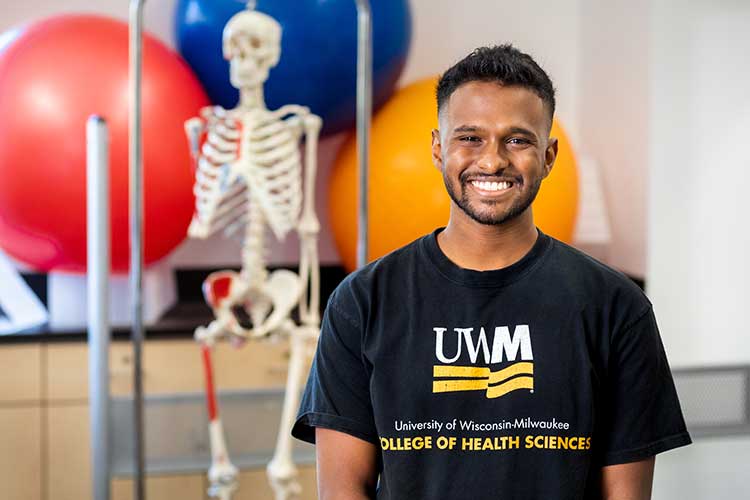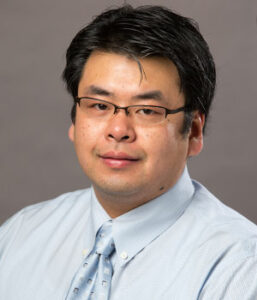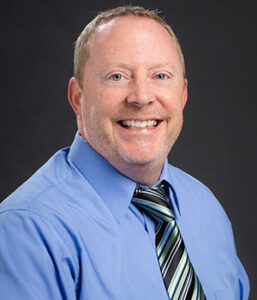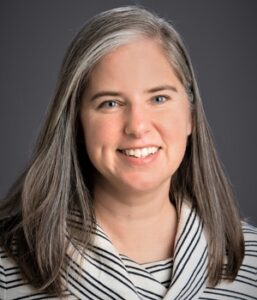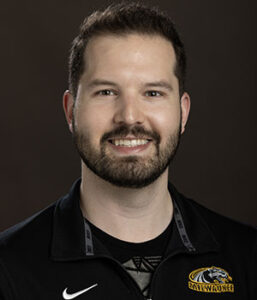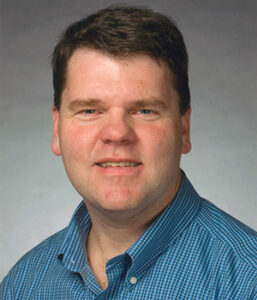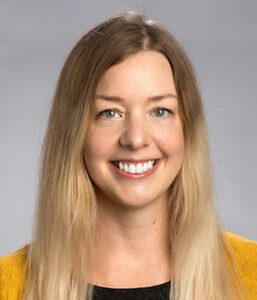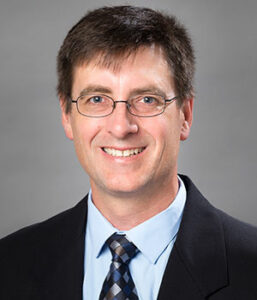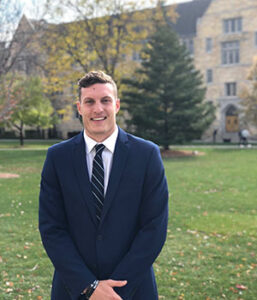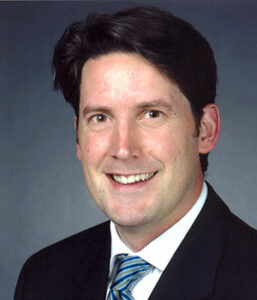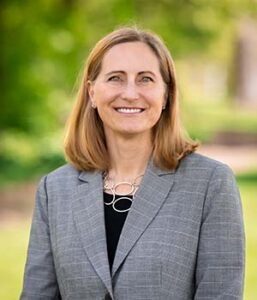BS: Kinesiology BS
Are you fascinated by the science of human movement? Then a kinesiology degree might be for you.
In the BS Kinesiology program you’ll delve into topics such as anatomy and physiology, biomechanics, psychosocial aspects of sport/exercise, motor development and more. You’ll graduate ready to apply your knowledge and skills in professional settings ranging from health care to sports to industry.
Program Type
Major
Program Format
On Campus
Kinesiology is…
“the academic discipline which involves the study of physical activity and its impact on health, society, and quality of life.”
– American Kinesiology Association
With the knowledge and skills you gain in the kinesiology degree program, you will have unlimited possibilities. Health and fitness director, strength and conditioning coach, fitness/youth sports coordinator, exercise specialist/technician, fitness/medical salesperson or personal fitness trainer are just some of the many careers you could explore.
Graduates of the BS Kinesiology program often pursue kinesiology-specific graduate degrees (specializing in biomechanics, exercise physiology, motor control, sport psychology, sport sociology) and other advanced degrees leading to careers in physical therapy, cardiac rehabilitation, chiropractic care, medicine and physician assistant.
- You will work with nationally recognized experts who conduct breakthrough scientific research in a wide variety of areas.
- The core requirements provide the basic theory and science, while the laboratory and hands-on experiential courses provide skills and encourage professional development.
- The health and fitness industry has been projected to be a growing industry in the country for the next decade.
- Kinesiology provides excellent preparation for students interested in physical therapy, strength and conditioning, athletic training, cardiac rehabilitation, occupational therapy, and other health professions.
Pre-2021 Student Handbook (PDF)
Fall 2021 – Present Handbook (PDF)
Employment Outlook
Earnings
| Occupation | Average 2019 Salary in Wisconsin |
|---|---|
| Athletic Trainer | $50,180 |
| Chiropractor | $86,010 |
| Community Health Worker | $47,440 |
| Exercise Physiologist | $54,900 |
| Medical/Health Services Manager | $111,640 |
| Nutritionist | $57,060 |
| Occupational Therapist | $76,260 |
| Occupational Therapy Aides | $28,750 |
| Personal Fitness Trainer / Aerobics Instructor | $32,030 |
| Physical Therapist | $88,570 |
| Physical Therapist Assistants | $53,210 |
| Physical Therapist Aides | $30,720 |
| Physician Assistant | $114,240 |
| Recreation Workers | $26,920 |
| Recreational Therapist | $46,740 |
| Social and Community Service Managers | $69,020 |
| Sports Coach | $33,430 |
| Umpires, Referees and Other Sports Officials | $32,620 |
Expected Growth
The kinesiology degree provides students with a strong educational foundation upon which to build a career. While many of our students pursue graduate school within 12 months of graduation, a significant number of students obtain immediate employment in the health and fitness industry.
Overall employment in the health and fitness industry continues to grow. Employment projections in kinesiology-related fields are strong. Between 2016 and 2026, Wisconsin is expected to see a 29.5% increase in physician assistants, 22.5% increase in physical therapy aides, 15.4% increase in physical therapists, and 11.3% increase in exercise physiologists. As an increasing number of people spend more time and money on health enhancement, fitness, and illness/disease/disability prevention, and as more businesses recognize the benefits of fitness and wellness programs, there is continued demand for high-quality health professionals.
Source: worknet.wisconsin.gov
Declaring Your Intent
If you are currently a UWM student and wish to change your major to “Kinesiology-Intended,” you must meet with an academic advisor to do so. Your kinesiology advisor will guide you through the declaration process and application to the major.
Admission Eligibility
You are eligible to pursue general education requirements and foundations courses associated with the curriculum, so long as you meet the necessary prerequisites for each course.
Students must meet the following criteria to be admitted to the kinesiology major:
- Complete of 30 college credits.
- Maintenance of 2.0 or higher cumulative GPA.
- Earned credit in the following kinesiology foundation course: KIN 270: Statistics in the Health Professions.
- Completion of the online application to the kinesiology major.
- Assignment of kinesiology faculty contact.
When the criteria are met and application accepted, the student will be admitted to the Kinesiology degree program.
Note: Admission and progression criteria (including curricular requirements) for the BS Kinesiology program are subject to change. Please contact advisor Torry Rufer at tjrufer@uwm.edu for the most current information.
Retention
Retention in the program and graduation are dependent upon maintaining good academic standing. Good academic standing is defined as:
- Maintenance of a 2.0 cumulative UWM GPA.
- Maintenance of a 2.0 kinesiology core GPA with earned credit in all kinesiology core courses. Students may not repeat more than three of the kinesiology core courses.
Application Submission
The application for admission to the kinesiology major is available during the months of February and September. Partner with your academic advisor every semester to identify the best time for you to apply.
- Application for spring admission:
Due by Oct. 1 in the preceding fall semester. - Application for summer/fall admission:
Due by March 1 in the preceding spring semester.
You will be notified of admission status within four weeks of the application deadline.
The BS in Kinesiology is a four-year curriculum that includes foundational studies, lab classes and professional preparation leading to the completion of 120 credits for the Bachelor of Science degree.
For more detailed information about the program’s current offerings, please visit the UWM Course Catalog.
Curriculum for students starting 2019 – Fall 2021(PDF).
Admission and progression criteria (including curricular requirements) for the Kinesiology degree program are subject to change as of the publication date of this catalog. Please contact advisor Torry Rufer at tjrufer@uwm.edu for the most current information.
General Education Requirements (GERs)
You are eligible to pursue general education requirements and foundations courses associated with the curriculum, so long as you meet the necessary prerequisites for each course.
| Course | GER | Credits |
|---|---|---|
| English: Must earn “C” or better in English 102 Prerequisite: placement test | OWCA | 3 |
| Math: Student must complete their Quantitative Literacy Part-A Prerequisite: placement test | QLA | 3 |
| Foreign Language: Satisfied with 2 years of a single language in high school | FL | 0 |
| Natural Sciences w/Lab: Select course from approved list. | GERNS+ | 3 |
| Arts: Select course from the approved GER Arts list | GERA | 3 |
| Humanities (in addition to TherRec 103 below): Select course from the approved GER Humanities list | GERH | 3 |
| Total credits: | 15 |
Foundations: Introductory Courses
Students must earn credit in each of the foundations courses.
A maximum of four courses may be repeated once.
| Course | GER | Credits |
|---|---|---|
| KIN 200: Introduction to Kinesiology Prerequisites: None | 3 | |
| KIN 220: Anatomical Kinesiology Prerequisites: None | 3 | |
| KIN 230: Health Aspects of Exercise and Nutrition Prerequisites: None | GERN | 3 |
| KIN 245: Client Diversity in Health Sciences Prerequisites: None | GERCD | 3 |
| KIN 270: Statistics in the Health Professions | QLB | 3 |
| ENGLISH 207: Health Science Writing | OWCB | 3 |
| TherRec 103: Life Balance: An Understanding of Leisure Prerequisite: None | GERH | 3 |
| PH 101: Introduction to Public Health | 3 | |
| Complete 3 credits of any NUTR Course | 3 | |
| Complete 3 credits of SPT&REC (Minimum 1 credit at 200-level ) | 3 | |
| Total Credits | 30 |
Core: The Major
Kinesiology students are required to earn credit in the following kinesiology core courses.
A maximum of three courses may be repeated once.
| Course | Offered | Credits |
|---|---|---|
| KIN 300: Professional Preparation Seminar | F/S | 1 |
| KIN 320: Biomechanics | F/S | 3 |
| KIN 330: Exercise Physiology | F/S | 4 |
| KIN 350: Psychological Aspects of Sport/Exercise | F/S | 3 |
| KIN 351: Sociological Aspects of Health/Movement | F/S | 3 |
| KIN 360: Motor Development | F | 3 |
| KIN 361: Principles of Motor Learning | S | 3 |
| KIN 400: Ethics & Values in the Profession | F/S | 3 |
| Total credits: | 23 |
Upper and Advanced Level Kinesiology Coursework
In addition to the kinesiology foundations and core requirements listed above, students will earn credit in a minimum of 12 credits of upper level and six credits of advanced level kinesiology coursework.
Upper Level Kinesiology Requirement
Select 12 credits from KIN 300-599
Advanced Level Kinesiology Requirement
Select six credits from KIN 500-599
Electives
Students may select elective coursework that aligns with their interests, as well as educational and professional goals.
Graduation Requirements
The following requirements must be met to graduate:
- Completion of the required 120 degree credits;
- Earned credit in required courses; and
- Cumulative UWM GPA of 2.0 and kinesiology core GPA of 2.0.
Pre-Physical Therapy and Pre-Athletic Training
“Pre-Physical Therapy” and “Pre-Athletic Training” are not undergraduate majors at UWM; rather, they are career classifications that allow the Zilber College of Public Health to identify UWM students who may benefit from special advising services.
To schedule an advising appointment, contact Torry Rufer at tjrufer@uwm.edu. You can also contact your advisor in your student center in PAWS.
When should I meet with my advisor?
You are encouraged to meet with your advisor at least once per semester to ensure timely progress to graduation.
- Enrolling for spring semester?
Schedule an appointment with your advisor in October or November. - Enrolling for fall semester?
Schedule an appointment with your advisor in March or April.
You are also welcome to schedule an appointment with your advisor at any time to discuss academic challenges, career opportunities or any other questions.
How can my advisor help me?
The Zilber College of Public Health boasts professional academic advisors who understand the challenges of balancing academics, work, family and the social aspects of college life. Advisors partner with you to:
- Explore your academic and career interests
- Plan the sequence of your courses
- Prepare for course enrollment
- Access tutoring and other academic support
- Identify opportunities for campus involvement
- Connect you to campus resources
- Plan for graduation
- Professor, Kinesiology, ACSM Physical Activity in Public Health Specialist
- cgreenl@uwm.edu
- 414-229-5341
- Enderis Hall 419
- Assistant Clinical Professor, Kinesiology & Program Director, FitWell
- sj@uwm.edu
- 414-229-5072
- Enderis 423
- Professor, UWM Associate Vice Provost for Research
- krisocon@uwm.edu
- 414-251-5277
- Enderis Hall 471
- Professor, Kinesiology Graduate Program Director
- sstrath@uwm.edu
- 414-229-3666
- Enderis Hall 449

